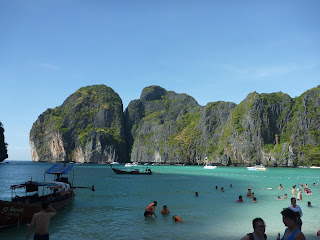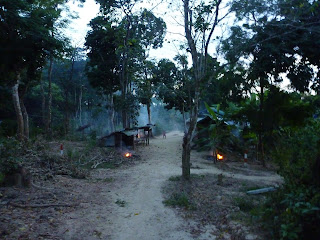The highway into Hanoi passes mud green rice paddies one after the other. The tips of sprouting plants in rows of wobbly parallel peek above the water and here and there move reed-hatted women bent in labour and buffalo dragging ploughs. At the outskirts of the city centre there is a large billboard with the pollution levels and an according physical analogue for easy interpretation: two smiley faces, two sad.
Hanoi shares much of Ho Chi Minh. Sky scrapers loom over tiny plastic chairs and gleaming international department stores rub shoulders with shady corner knock-offs. Five-star restaurants are around the corner from scrapheap metal huts and decaying concrete, and the footpaths are clogged with motorcycles. People fill the gaps in all manners of existence as they watch, hawk, eat and rest on their haunches.
Hanoi shares much of Ho Chi Minh. Sky scrapers loom over tiny plastic chairs and gleaming international department stores rub shoulders with shady corner knock-offs. Five-star restaurants are around the corner from scrapheap metal huts and decaying concrete, and the footpaths are clogged with motorcycles. People fill the gaps in all manners of existence as they watch, hawk, eat and rest on their haunches.
 |
| Breakfast relaxation |
But where the centre of Ho Chi Minh is full of broad streets and relative modernity, in Hanoi many of the streets are narrow and have gnarled trees leaning haphazardly over them with dirty buildings in various states of disrepair.
More motorcycles, overburdened with entire families or the day’s produce for market, cough unhealthily with a laconic indifference to the flux of congestion. The scattered cars, attempting to navigate the clogged arterials, straddle the dotted line down the middle of the road, honking without cease to warn those ahead out of their way. On many streets the outermost lanes house not cars, but pedestrians and vendors, their wares dusty and the retailers with facemasks against the fumes.
That said, there is very little pedestrian traffic. People move on their motorbikes or bicycles, and any spare plot of footpath is an eligible parking spot.
 |
| The heat |
There is a practical ambivalence to overt displays of caution here. If it needs to fit on the back of your motorcycle, you’ll find a way to fit it. Everyone else will recognise the necessity of this, and let you motor along at half the speed of traffic and with cargo jutting out.
In Ho Chi Minh, like Hanoi, life is in the open. Store fronts give way to living rooms. A family dines on the footpath, parents and children around a low table. Their home is open behind them, TV on. On the side of a four-lane road three men sit in small plastic chairs under an umbrella with cables snaking towards a TV set up. The music is loud enough to be heard at the end of the street and one, with a microphone, is kareokeing. A man selling ice-cream from the back of his bicycle is moving slowly along, coasting to a stop at the side of the road. He walks to the nearest wall to urinate.
 |
| Hoi An |
It is difficult to get people’s attention through eye contact. I put it down to living in the open. With people constantly passing, it would be a chore to respond to every glance sent one’s way. Watching is something of a pastime in Ho Chi Minh. Morning is the best time of day, the bustle of a fresh day unfolding through motorcycles and street pho. Vendors bring around newspapers, one even carrying the Sydney Morning Herald and The Australian. Ice coffee and a seat in the shade. This is the appropriate speed.
In my search for excellent pho I found one vendor in Hoi An with a particularly brilliant secret. Pork scratchings. Thrown into the broth as it goes over the thinly sliced beef, the distinct rich roasted fatty taste adds a tantalising dimension.
In Hanoi they have adapted French traditions into their own. Specifically their café culture with tables and chairs oriented for people watching. But instead of espressos and wicker chairs, there is ice coffee and plastic chairs and stools. Across Vietnam and Cambodia is the ubiquitous banh mi—baguettes with pork products or omelettes, fresh herbs and sweet and salty sauces.
 |
| Birds |
At night along Pham Ngu Lau Street in Ho Chi Minh the tiny bars set up plastic chairs all over the footpath and onto the road. This is precious real estate. At 7000 dong a beer, roughly 35c, they do a brisk trade. When word spreads of the police driving down the street, there is a sudden rush. People are hustled off chairs which are packed up off the road, as it is illegal to encroach on it like this. I was concerned. The lady had taken away the tray our beer had been resting on. While we had secured our beers, she had my dried squid. Sold from the back of bicycles, the delicate wisps are taken down and scorched over an open flame, sliced up and served with some chilli sauce. There was also a man flogging boiled peanuts. Excellent beer snacks.
At the particular establishment we were attending there was an officious old lady who oversaw the distribution of beer and the exchanging of money. We called her Grandma. The second you were done she’d arrange for more, unfolding her massive wad of bills expectantly. She brought one superfluous beer to our table one time and wandered off without taking money. We rashly thought, free beer?! After Anders and I had split it, she rolled over. “7000 dong.”
 |
| Taking it easy |
These plastic chairs and tables are packed with both locals and tourists alike. Anything you could want drifts by. Food, books, Gucci purses, movies, cigarettes, sunglasses. More chairs emerge as the night goes on and small groups morph organically, evolution in the form of outrageously cheap beer.
Still cheaper beer can be found in Hoi An. 4000 dong a glass. More culturally relevant in Hoi An is the old town. The product of the confluence of many traders and much money, the town is beautiful and quaint. By some chance it remains relatively uncorrupted by the tourist presence. There is of course tat and the catering to the dollar, but unlike places like Thailand where infrastructure is tailored to bring tourists, here it feels like tourists are welcome, but the town is how it is.
 |
| A hard day's work |
Lanterns hang over the streets and at night you can buy them to float down the river. Birds chirp and flutter in cages in front of most stores. There is only one bar that blasts loud music and it just feels wrong. Thankfully it is almost empty. This is a beautiful and sleepy place. The markets here are some of the most pungent. Equal wafts of intense Vietnamese herbs and raw meat and seafood.
About three kilometres from Hoi An is the first beach I’ve seen for some time that has surf. It is also the first time for some time that I’ve been excited to go to the beach. With the AFL schedule having recently appeared before my eyes, this would be a frequent destination. Ideal for a 3km time trial (many seconds need to be shaved off my pace) or a calf-ruining beach run. Jogging back from the beach I overtook some very slow moving girls on a bike, much to their entertainment. They followed me the rest of the way, talking loudly.
 |
| Old Town, Hoi An |
Apparently there is an 80kg limit on bicycles. Given Jess can’t ride, the system of her sitting on the back while I cycled that we had employed one day—not to mention the fact that I exceed 80kg comfortably on my own—was not an option when the rental lady noticed our setting off. So we were flogged a moped. Hardly miffed at the opportunity to hurtle around the countryside, we drove through most of Hoi An and indeed beyond the city limits. Overtaking cyclists, passing through rice paddies and being overtaken by honking cars. Unknowingly heading along a long dead-end street through a fishing village, by the time we reached the end as it drifted into a dusty boat repairing area, the incredulous looks suddenly made sense.
Cambodia feels at times like a shonkier Vietnam. The people are friendlier, but the buses are slow, the streets rutted, the food bland. US dollars come out of ATMs and Cambodian Reals are given back as change. Many reals disappear in the conversion process.
 |
| Lanterns |
On the bus from Siem Reap to Phnom Penh the locals at the back decided the trip was too boring. At the first stop they bought plastic bags full of ice and beer and became increasingly more merry and loud as the journey went on, all cackling laughter and bus-toilet runs.
The killing fields are deceptive. From a distance what looks like a verdant field in what was once an orchard is up close filled with bone fragments and earth distended and bloated from burial and excavation. There is a tree against which babies were beaten. Bullets were too expensive, so people were killed imperfectly with farm tools. The rainy season sees ever more fragments and relics wash to the surface.
S21 prison holds countless photos of those interned. Gazes from anger to desolation. A reflex smile and eyes of despair. A repurposed school, the exercise equipment was used for torture, the institution of education not needed in a regime that celebrated peasant equality.
 |
| Le francais |
Nursing an ill-advised choice of sugary drink we saw two grimy kids in Phnom Penh sifting through garbage bins for cans and bottles. As we walked past I gave them my can, which, when they realised was still half-full of beverage, delighted them. It was strange to feel guilty, knowing that I could have done so much more.
 |
| Public life |
To get into the mausoleum of Ho Chi Minh in Hanoi you have to first be whistled at by a guard to work out that the logical direction of approach, from in front, is incorrect. You are then herded around the periphery, stripped of your bags, and then funnelled endlessly along before you appear, once more, in front of the mausoleum. His skin looks waxen and the shuffling gawping feels quite awkward. You can’t have your hands in your pockets. The guards are vigilant and emerging back out into daylight after such a long build up to such a short and eerie climax is unsatisfying.
 |
| S21 |
Walking back to collect our bags, Jess was pulled to a stop by one Asian lady. “Please, please.” She stood next to her as a man with a video camera hunched down to take a photo of the two of them in front of the mausoleum. Two rows of schoolkids all pause their chatter to stare at me. Some wave, some say hello. More yet giggle as I pass.
In Hanoi now with Jess, today Aaron arrives. Plans need to be made regarding motorcycles and a journey south.






















